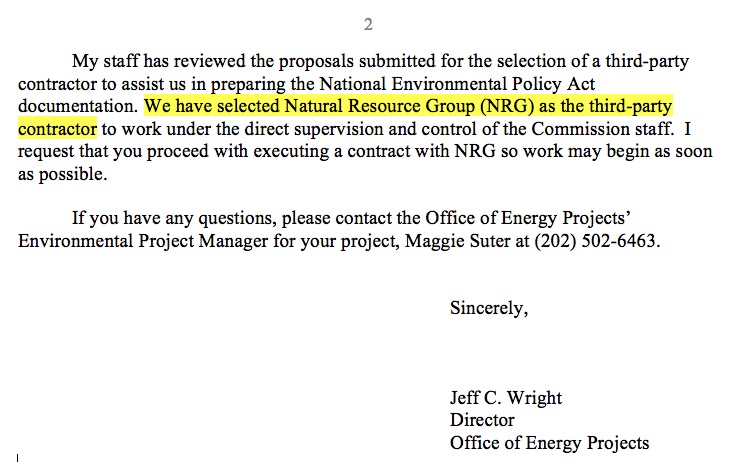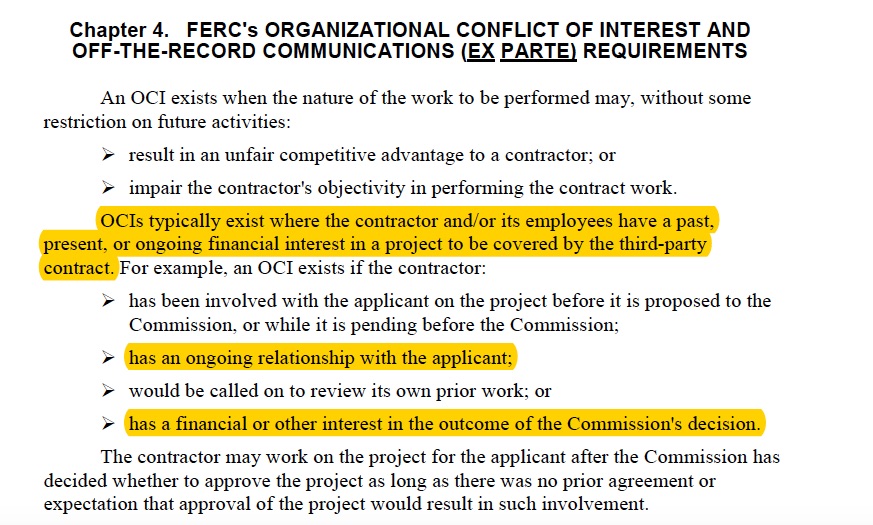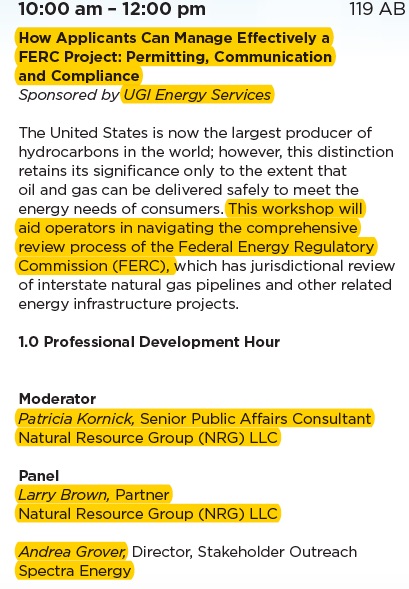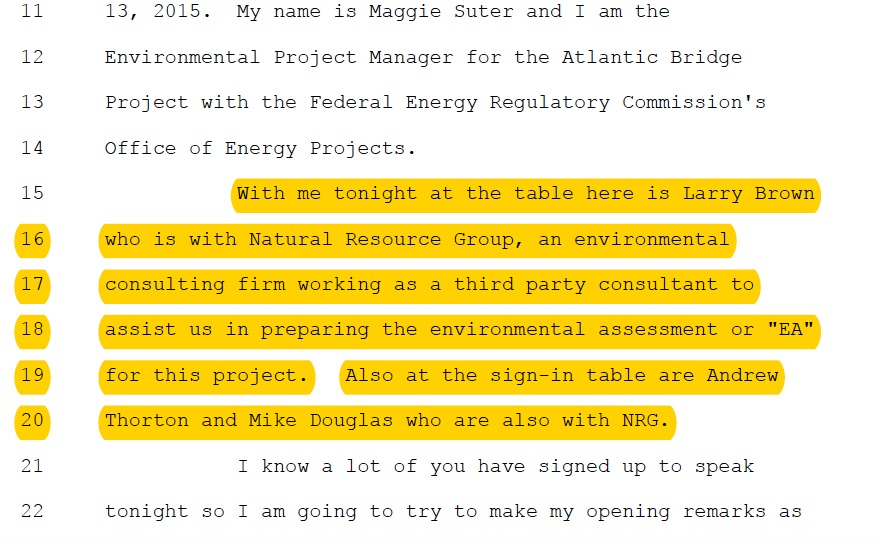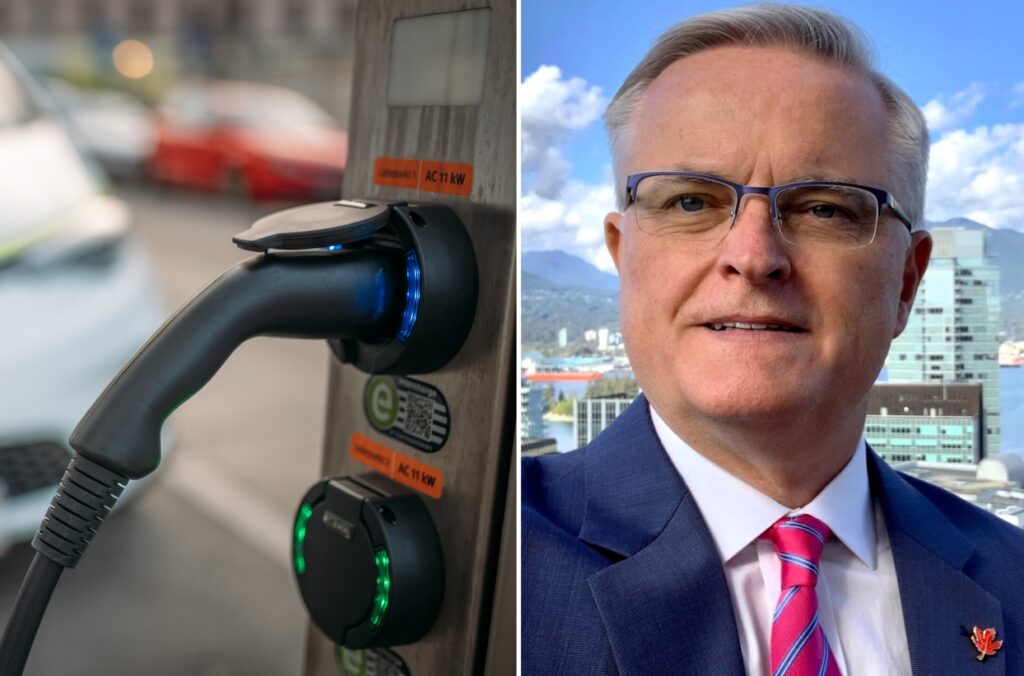A contractor hired last year by the Federal Energy Regulatory Commission (FERC) to review a proposed gas pipeline by Spectra Energy, had already been working for the company on a related project, a DeSmog investigation has found.
Such an alleged conflict of interest suggests that the contractor had a financial stake in approving the project it was hired to review.
As part of a formal Pre-Filing Review Process for Spectra Energy’s Atlantic Bridge project, FERC hired in early 2015 a third-party contractor to review the pipeline. A proposed expansion of the company’s existing Algonquin Pipeline carrying fracked gas from Pennsylvania to the Northeast US and Canada, the project involves the construction of several new pipeline segments in New York and New England and a new compressor station in the town of Weymouth, Massachusetts.
The contractor, Natural Resource Group (NRG), is a subsidiary of ERM, an international consulting company that previously provided the favorable environmental review for the northern part of TransCanada’s Keystone XL Pipeline. DeSmog has prolifically documented ERM’s deep ties to the fossil fuel and tobacco industries and shady international operations. ERM is owned by two Canadian investment firms – OMERS Private Equity and AIMCo – with investments in energy infrastructure
FERC hired NRG to conduct an Environmental Assessment (EA) for the Atlantic Bridge pipeline, manage public outreach and engagement, and review the project’s alternatives.
According to FERC’s guidelines, while third-party contractors work under the supervision and control of FERC staff, they are paid by the pipeline company seeking FERC’s approval. The company is also responsible for bidding potential contractors, with FERC approving the eventual hire.
According to financial reports submitted by Spectra to FERC, since 2011 the company has paid NRG a total of over $2.5 million for services on a number of its projects under FERC review.
NRG’s Other Spectra-related Project
DeSmog has found that apart from being funded by Spectra to review Atlantic Bridge, NRG seems to be in an even more glaring conflict of interest in the project.
On February 20, 2015, FERC sent a letter to Spectra, announcing the selection of NRG as contractor for Atlantic Bridge. Yet at the time, NRG was already working directly for PennEast LLC, a major pipeline consortium of which Spectra is a member. NRG has been conducting public affairs for PennEast since at least 2014. A year earlier, NRG opened an office in the Marcellus Shale to represent energy companies operating in the region.
(Image from a February 2015 letter from FERC to Spectra, announcing the hiring of NRG to review Atlantic Bridge. Source: ferc.gov)
When Spectra joined the PennEast Pipeline consortium in October 2014, Spectra executives made clear their purpose was to bring fracked gas from the Marcellus Shale to its Algonquin Pipeline, of which the Atlantic Bridge project is a part.
In other words, NRG, which works directly for PennEast, has a financial stake in the approval of Atlantic Bridge, the project it was hired by FERC to review as third-party contractor.
According to FERC’s own guidelines for hiring third-party contractors, a conflict of interest exists when the contractor “has a past, present, or ongoing financial interest in a project to be covered by the third-party contractor.” This exists, for instance, when the contractor “has a financial or other interest in the outcome of the Commission’s decision.”
(Image from FERC’s own guidelines on the use of third-party contractor, suggesting a conflict of interests between NRG and Spectra. Source: ferc.gov)
NRG Helps Write an Environmental Assessment Beneficial to Spectra
Atlantic Bridge’s Environmental Assessment (EA), published by FERC in May this year, is favorable to Spectra. The EA – prepared largely by NRG staff, who were funded by Spectra – found the project not to “constitute a major federal action significantly affecting the quality of the human environment.”
Along with a host of recommended mitigating actions, the report concludes that Atlantic Bridge will have “no significant impact,” essentially paving the way for an ultimate FERC approval of the project.
The EA also denied multiple demands by residents near the project and other stakeholders to conduct a more thorough Environmental Impact Statement (EIS).
Atlantic Bridge is currently pending final FERC approval. In the meantime, Spectra submitted filings for a separate, but linked, project in the area – Access Northeast. NRG, in its capacity as third-party contractor, is reviewing this project as well.
Opponents of the two pipelines have demanded that FERC review both projects as one, in the hope of receiving a more comprehensive environmental and health analysis. Thus far, FERC has declined to unite the two projects.
Industry-funded Contractors are Presented as FERC’s
This case – where a contractor hired to review a pipeline is not only funded by the company seeking FERC approval but also has a financial interest in approving the project – highlights the broader question of how FERC maintains its independence from the industry it regulates.
FERC’s website publishes a handbook on how to use third-party contractors. In order to navigate the odd situation whereby such contractors work for FERC but are paid by the company under FERC’s review, the text includes a variety of guidelines on how to choose contractors and demarcate the division of labor between them and FERC.
According to the guidelines, FERC staff will “have complete control over the scope, content, and quality of the contractor’s work” and “sole ownership of all documents (other than those related to financial aspects) produced under the contract.”
The guidelines also prohibit the energy company funding the contractor to review the work product before its release to the public.
Yet given the constant contact between the contractor and the applicant’s employees during the review process, this seems a difficult feat to accomplish. For instance, FERC documents show that NRG and Spectra representatives engaged in regular bi-weekly meetings during the Pre-Filing Review Process for Atlantic Bridge.
DeSmog also discovered that while the review was ongoing, Spectra and NRG participated in a panel at an industry-funded conference on the Marcellus Shale in September 2015.
The panel, titled “How Applicants Can Manage Effectively a FERC Project,” was moderated by PennEast’s spokesperson Patricia Kornick, who is an NRG employee. Panelists included Larry Brown, an NRG senior vice president who at the time was leading the EA on Atlantic Bridge, and Andrea Grover, Spectra’s Director for Stakeholder Outreach.
To connect the dots: while Spectra-funded contractor NRG was conducting the EA for FERC on Spectra’s Atlantic Bridge project, both companies met with other industry representatives to offer tips on successfully maneuvering a FERC application. All while being moderated by an NRG public affairs specialist who was simultaneously working for a Spectra pipeline related to Atlantic Bridge.
(Image from the program of Shale Insight Conference 2015, showing collaboration between NRG and Spectra)
Another problem relates to contractors’ transparency. During public scoping meetings, where contractors are present alongside FERC officials to hear local residents’ concerns, FERC does not acknowledge the contractor’s funding source.
DeSmog reviewed numerous scoping meeting transcripts from the past 8 years, and in none of them did FERC staff clarify that contractors are funded by the industry. Instead, contractors are presented to the audience in these meetings as “working for FERC,” “assisting FERC,” “an extension of FERC,” or “with us” [i.e. FERC].
This is, at the least, a selective description. At worst, it is outright misleading.
To further confuse matters, in a document on FERC’s website announcing a training seminar, several NRG employees are listed under the inaccurate title of “FERC Staff Bios.”
At Weymouth Public Meeting, Spectra-funded Contractor Presented as FERC Staff
Two such public meetings were held in the past year in Weymouth, Massachusetts, where Spectra plans to construct a gas compressor station in the middle of town as part of the Atlantic Bridge project. Both meetings, which were held in the town’s middle school auditorium, were attended by hundreds of residents and other stakeholders from the area.
NRG employees sat on the stage alongside FERC officials, facing the audience.
In the first meeting, NRG employees were presented as “third party consultants assisting us”. In a public meeting last week on the Access Northeast project, FERC officials introduced NRG employees as “representing FERC.”
(Image from the minutes of a FERC public meeting in Weymouth MA, May 2015. Spectra-funded contractor’s staff are presented as “assisting FERC,” with no mention of their funding source. Source: ferc.gov)
Both meetings were highly charged, with a great majority of speakers strongly demanding that FERC deny the project. A smaller number of people voiced support.
Yet all Weymouth residents DeSmog spoke with assumed they mere addressing FERC staff.
Weymouth Town Councilor, Becky Haugh, who has been a vocal opponent of the Atlantic Bridge and Access Northeast projects, was stunned to learn from DeSmog that Spectra has funded NRG’s work on the EA.
“I had no clue,” says Haugh. “This is news to me.”
Haugh is also surprised to learn that NRG employees sat alongside FERC staff at the town’s public meetings. “I thought they were all direct employees of FERC,” she told DeSmog.
When contacted by DeSmog for comment, NRG’s senior vice president Larry Brown, who was present in both the Weymouth meetings, said he could not respond to the issues raised in this article since his company is under contract by FERC. Brown referred DeSmog to FERC.
A FERC spokesperson denied third-party contractors are generally in a conflict of interest and said that such relationships are transparent. She referred DeSmog to the Commission’s handbook guiding the hiring and use of such contractors.
FERC was asked specifically to comment on NRG’s alleged conflict of interest in the Atlantic Bridge project. Again, the spokesperson referred DeSmog to the handbook.
Spectra Energy did not return several requests for comment.
Blog image credit: www.nocompressor.com
Subscribe to our newsletter
Stay up to date with DeSmog news and alerts



